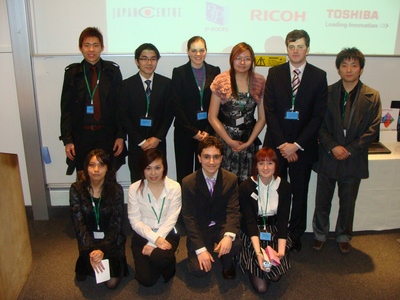Great speeches live long in the memory. Throughout history they have served to inform, persuade and move us to action. From the orators of the Roman Forum to battle-weary generals on the big screen, the power of words can never be underestimated. Following in this grand tradition, on Saturday 21st February, were ten students, hopeful that their offering could also stand the test of time. Thus began the Fourth Japanese Speech Contest for University Students.
Yet in many ways, theirs was a more demanding prospect. Passion and content were naturally key elements, but they also had to deliver their words in a foreign language and in front of an audience largely comprising native Japanese speakers, before facing the searching questions of the judges - again in Japanese.
The event, co-organised by BATJ and the Japan Foundation, saw an extremely high standard, which was reflected by the excellent prizes on offer. As well as the full programme of speeches, the audience was also treated to a raffle, with the chance to win many great prizes, and watched an informative video about Nishijin textiles and one man's attempt to create a cloth depicting the Tale of Genji.
The day began with the Category 2 finalists, who study Japanese as an elective course. Such was their confidence and proficiency, it is difficult to believe that these students do not study Japanese full-time. Bryan Woon took first place with his speech on Japanese salarymen, and he was closely followed by Chang Liu, giving her views on school violence.
Category 1 came next, in which students who study Japanese as their main degree subject were able to showcase their talents. Competition was fierce, with speeches about Japanese language education, the bathhouses of Japan, one man's robotic dream, and the education of the deaf all pitted against each other. However, it was Jonathan King who earned the plaudits of the judging panel, receiving first prize thanks to his speech examining the new lay judge system in Japan.
Looking back on his victory, Jonathan remarked:
"Taking part in the speech contest has been a really good experience and also a great networking opportunity. As for what I'm going to do with the prize money and trip to Japan, my tea collection has just run out so I'm looking forward to going back to Japan to buy some more and visit my favourite tea shops!"
Min Park, one of the Category 1 finalists, also said:
"It was a fantastic event and I learnt so many things. I couldn't win this time, but I will try again next year!"
Many congratulations to the participants and also a big thank you to all the organisers. We would also like to extend our appreciation to the generous sponsors: Baker & McKenzie LLP, Eikoku News Digest, The Great Britain Sasakawa Foundation, Japan Airlines, Japan Centre, JP-Books (JPT EUROPE LTD), Ricoh UK Ltd and Toshiba of Europe Ltd. どうもありがとうございました!
The Results:
Category 1:
Winner - Jonathan King, University of Edinburgh - A new lay judge system for the benefit of whom? - 誰のための裁判員制度?
2nd Place - Alison Sinead Evans, University of Oxford - Sign language and the Education of the Deaf - 手話と聴覚障害教育
Finalists:
Luke Happle, School of Oriental and African Studies
Phillippa Harvey, University of Leeds
Min Park, University College London
Category 2:
Winner - Brian Woon, University of Warwick - Is the Japanese salaryman fast becoming a relic of the past? - 変わり行く日本の中でサラリーマンは生き残れるのか
2nd Place - Chang Liu, Imperial College London - School Violence in Japan, China and the United Kingdom - 校内暴力――日、中、英国間の違いと解決方法
Finalists:
I-Ting Li, University of Hull
Hock Boon Ong, Imperial College London
Yi Zhang, University of Exeter
Please click 'Download Attachment' for a summary of the winners' speeches and a report by Brian Woon on his Speech Contest experience, as well as more photos from the day itself. |




 Japanese Language Navigation
Japanese Language Navigation
